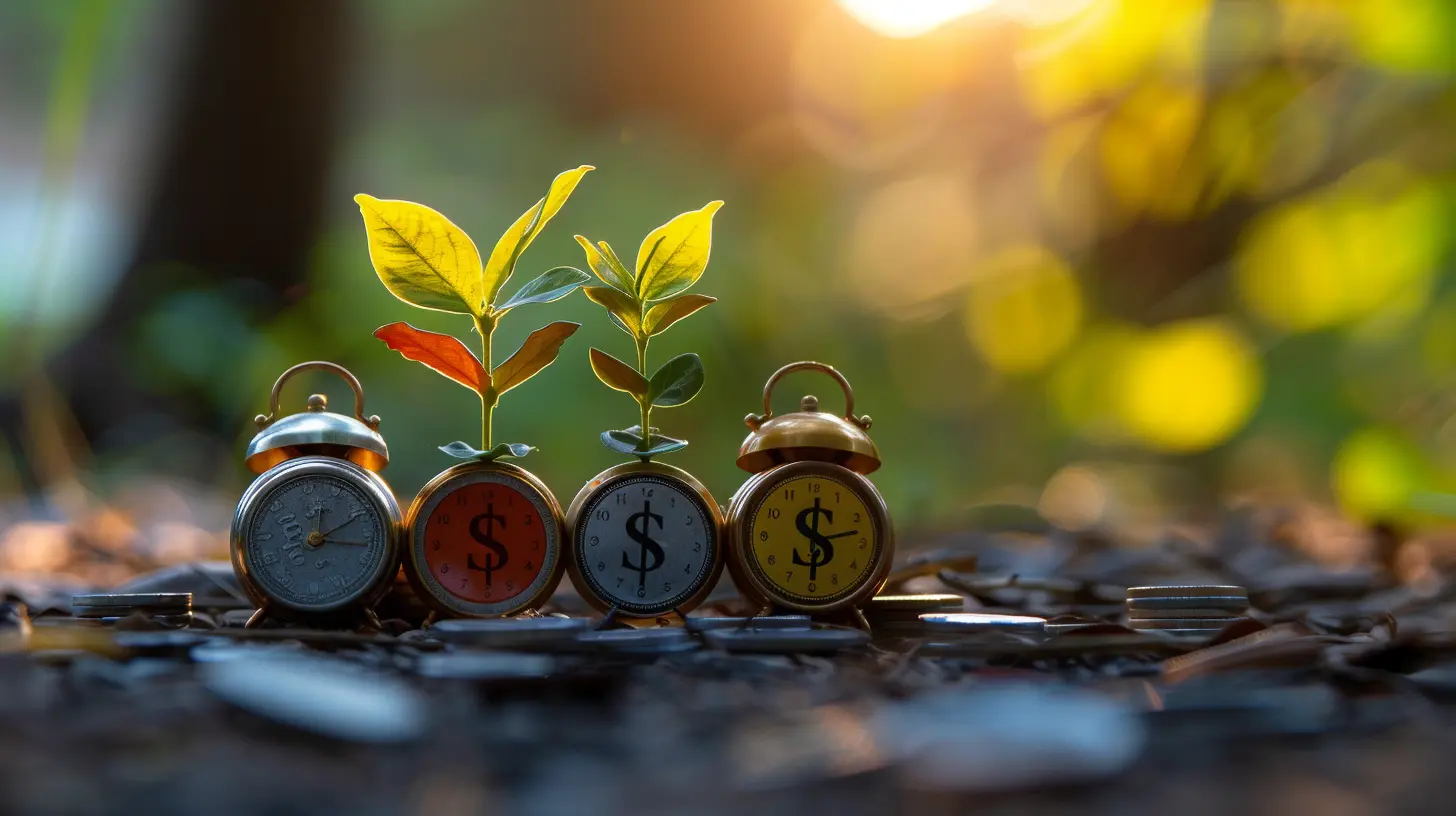The Power of Saving Early: Why Time Is Your Greatest Asset
15 September 2025
Let’s face it: saving money doesn’t sound very exciting. It’s way cooler to think about traveling the world, buying the newest tech, or splurging on a shopping spree. But here’s a little secret that most wealthy people already know—if you start saving early, you’re setting yourself up for a future that’s less stressful, more flexible, and filled with opportunity.
So, what makes early saving so powerful? In a word: time. Or better yet, compound interest fueled by time. Stick with me, and I’ll show you why every dollar you save now could be worth far more than you might think later.

The Time Value of Money: Why a Dollar Today Is Worth More Than Tomorrow
Let’s kick this off with a bit of a thought experiment. Imagine you bury $100 under a tree today and dig it up 20 years from now. Would it have grown? Nope. It would still be $100 (and maybe dirty). But if instead, you invested that $100 in something that earns 8% a year, you’d have roughly $466 after 20 years.That’s the time value of money in action. In simple terms, money you have now can earn interest or returns, making it worth more than the same amount in the future. The earlier you start saving, the more you allow your money to snowball and grow without doing much extra work.

Compound Interest: Your Financial Superpower
Think of compound interest as your money’s ability to make friends with other money. Here's how it works: you earn interest on your initial savings, and then you earn interest on that interest, and then on that interest, and so on.Let’s say you save $200 a month starting at age 25, and you invest it with an average return of 7%. By the time you're 65, you’d have about $525,000. But wait—what if you started just 10 years later, at age 35? You’d end up with only $244,000. That’s a $281,000 difference! All because of a 10-year head start.
Crazy, right?

Starting Small Still Makes a Huge Difference
Don’t get discouraged if you’re not rolling in cash right now. You don’t need to be rich to start saving. In fact, starting small is perfectly fine. What matters more is building the habit and giving your money time to grow.Even just $50 a month could turn into thousands down the road. And once you make saving a routine, increasing your contributions becomes easier over time as your income grows or your expenses go down.
So, whether it’s skipping a few coffee shop runs or cutting back on impulse buys, those little changes can have a massive impact.

The Earlier You Start, the Less You Have to Save Later
Here’s a fun twist: the earlier you begin saving, the less money you actually need to stash away overall.Let’s break it down:
- Save $200/month from age 25 to 35 and then stop contributing entirely…
- Versus saving $200/month from age 35 to 65.
Even though the second person saves for 30 years, they end up with less than the first person. That’s because the first saver gave their money more time to grow. That’s the kind of math that should get you excited!
Habits Beat Windfalls Every Time
A lot of people wait to save until they “make more money.” But waiting for the perfect moment might mean missing the best moment. There’s a reason the phrase “start today” exists. It’s because getting into the habit of saving—even just a little—can be more powerful than a sudden windfall.Let’s be honest: how many lottery winners do you know who stayed rich? Not many. That’s because building wealth is more about discipline than luck.
Starting early helps you train your financial muscles. You get better at budgeting, avoiding lifestyle creep, and prioritizing long-term goals. Like going to the gym, the results compound over time.
Financial Freedom Starts with Early Saving
You’ve probably heard the phrase "financial freedom" tossed around a lot lately. But what does it really mean?It means having the option—not necessarily the obligation—to make choices. Want to take a year off to travel? Switch careers? Retire early? Financial freedom gives you that power. And the key to unlocking that freedom? Saving early.
When you start young, you give yourself the gift of flexibility. You don’t have to work into your 70s unless you want to. You won’t be tied down by debt or paycheck-to-paycheck living. That’s the true value of early saving—it gives you control over your future.
Kids and Teens: Yes, They Can Save Too
If you’re a parent, there’s no better gift you can give your kids than teaching them about saving early. Kids who learn the basics of money management young tend to grow into financially responsible adults.Open a savings account for them. Match their savings from chores or part-time jobs. Teach them about compound interest with simple charts or online tools. It might seem small now, but they’ll thank you a lot more for this than for that expensive toy they forget about in a year.
Automate and Forget It: Your Set-It-and-Forget-It Strategy
Let’s make things super easy—set up automatic transfers to your savings or investment account. That way, you don’t even have to think about it. The money leaves your account before you have a chance to spend it.It’s like paying yourself first. Because if you wait until “what’s left at the end of the month,” chances are there won’t be much there.
Keep it out of sight and out of mind, and watch your savings quietly build in the background.
Avoiding Lifestyle Inflation
You get a raise—it’s awesome. But then you upgrade your car, move into a more expensive apartment, and suddenly your expenses catch up to your increased income. That’s called lifestyle inflation. And it’s one of the sneakiest threats to your financial future.Saving early helps develop the discipline to resist that temptation. As your income increases, if you keep your living expenses in check and channel that extra income into savings or investments, you’ll be way ahead of the curve.
Emergency Funds: Your Financial Safety Net
Saving early isn’t just about retirement or long-term investing. It’s also about protecting yourself from life’s curveballs. Car breakdowns, medical bills, sudden job loss—they happen. That’s where your emergency fund comes in.Start stashing away 3 to 6 months' worth of expenses. Keep it in a high-yield savings account that’s easy to access but separate from your everyday checking. It’s peace of mind in case things go sideways.
The Emotional Benefits of Saving Early
Let’s not ignore the emotional side of money. Living paycheck to paycheck? Stressful. Watching debt pile up? Overwhelming. Not knowing if you'll ever retire? Terrifying.But having savings—knowing you’re building a financial cushion—brings a sense of security and confidence. You sleep better. You walk taller. You feel more in control of your life.
And yes, those feelings grow with every dollar you save.
Where to Start Saving and Investing
Ready to start? Awesome. Here’s a quick rundown on where to begin:- Emergency Fund: Your first savings priority.
- Employer 401(k) or 403(b): Especially if there’s a company match—always take free money!
- Roth IRA or Traditional IRA: Tax advantages help your money grow faster.
- High Yield Savings Account: For short-term goals or emergency savings.
- Index Funds or ETFs: Great for long-term investing with low fees.
Start with what you can, and build from there. The important thing is to begin—even if it’s baby steps.
Don’t Beat Yourself Up If You’re Starting Late
Okay, so maybe you didn’t start saving in your 20s. That’s fine. The second-best time to start is right now. What matters is not how early you start but that you start at all.You may have to save more aggressively or make lifestyle adjustments, but it's totally doable. Don’t let past decisions hold you back from a smarter future.
Saving Is About Saying Yes to Your Future
Some people think saving is about saying no. No to fancy dinners, no to vacations, no to fun.But it’s really about saying yes—to more choices, more opportunities, more freedom. Yes to retiring on your terms. Yes to helping your kids with college. Yes to starting a business or pursuing a passion without financial anxiety.
Every dollar you save today is a downpayment on a better tomorrow.
Final Thoughts
Let’s wrap it up: The power of saving early comes down to one truth—time is your greatest asset. The earlier you start, the harder your money works for you. And when you combine time with consistency, discipline, and a sprinkle of smart investing, you set yourself up for a future that’s truly limitless.So, whether you’re 18 or 38—it’s never too late to start. But if you do have time on your side, don’t waste it. Future You will be endlessly grateful.
all images in this post were generated using AI tools
Category:
Financial EducationAuthor:

Zavier Larsen
Discussion
rate this article
1 comments
Lola Velez
This article beautifully highlights the importance of starting to save early. Time truly works in our favor when it comes to financial growth. Investing in savings now can lead to a secure future. Thank you for sharing such valuable insights!
September 20, 2025 at 4:34 AM

Zavier Larsen
Thank you for your thoughtful comment! I'm glad you found the article valuable. Starting early truly makes a significant difference in financial growth.


